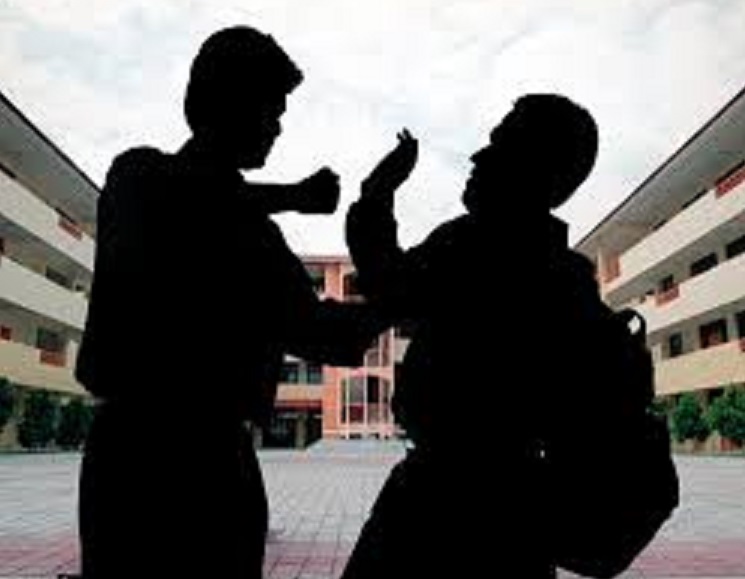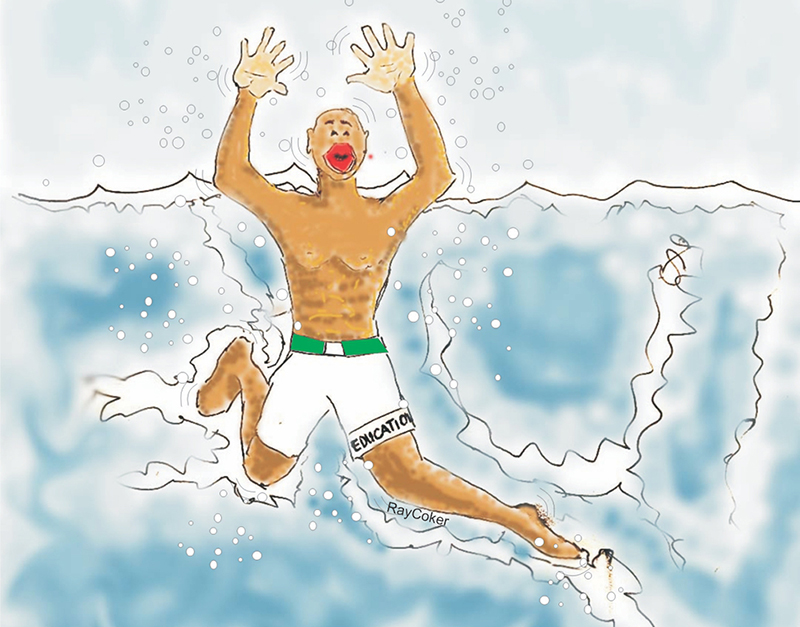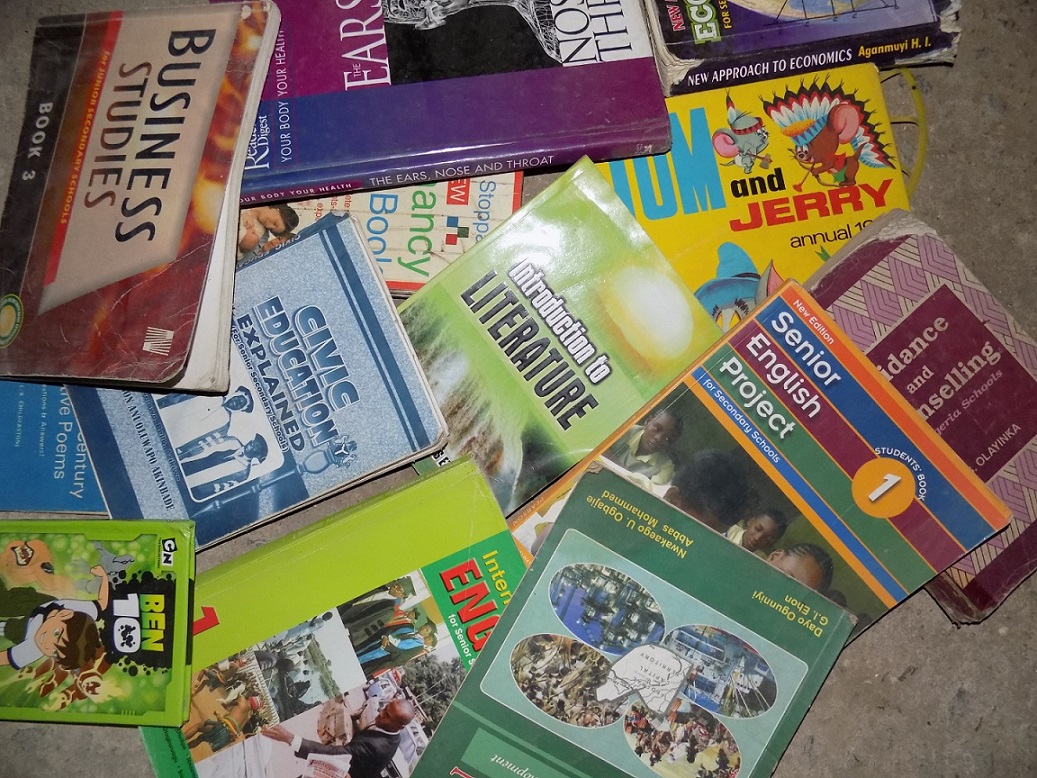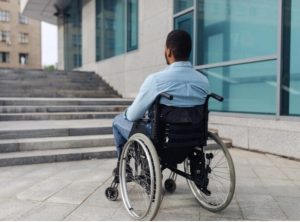
Bullying in school | Credit: thesun.my
The recent act of bullying in Leads International British School, Abuja (LIBS), is still fresh in our minds and the ensuing drama is a sore point in policy and administration. This write-up tries to address the issues arising and how to suppress acts of bullying in our schools.
The story of a student of LIBS, Abuja was first brought to the public by social media and later orchestrated by the mainstream media in a very unprofessional manner.
The visuals show a girl being slapped several times by another. This video went so viral that it got people worried about the safety of children in schools, more so that incidences of bullying have been making headlines of different dimensions lately.
In the LIBS case, perhaps because it is an elite school, is of great concern, to look at all angles and emotions exhibited by all affected by the incident and come up with how best issues like this should be handled rather than being consumed in emotions.
In a swift reaction to this case, the minister of Women affairs, Uju Kennedy-Ohanenye rushed to the school, a ministry not directly under her purview, and was seemingly coerced, by another woman (possibly one of the relatives of the child who was bullied ) shouting “this school must be shut down today”.
The parents and relatives were also emotionally charged that the girl who bullied the other was slapped by one of them in the full glare of everyone. That in itself was an unacceptable act. The father of the bullied girl also threatened to press charges, insisting on going to court to get justice if nothing is done within 48 hours. In all of this, it took a while before the Ministry of Education could come up with its position. This unwarranted drama came into play because the theatre is an elite school, and in their respective act have taken their roles beyond acceptable limits.
It is also surprising that the media would also be relaying this event on their news network without blurring the faces of the students involved, forgetting the lasting trauma the whole issue would have on the girls later in life. If those on social media are showing these videos to chase clouts and followers, should big TV stations like the NTA join the train of simpletons? This action negates the Child Rights Act.
The fact that this video is easily accessed and played many times in itself can go for cyberbullying on both girls- the one that bullies and the bullied. Many of the comments made by those who visited the post are enough to traumatize the girls for the rest of their lives or worse still, lead to their taking untoward steps unless they are counseled by professionals or those posts are flagged and pulled down from Youtube and the likes.
The bullying incidence in LIBS could be likened to the experience of Lufuno, a teenage schoolgirl from Limpopo Province, South Africa who was repeatedly bullied at school. On April 30, 2021, Lufuno Mavhunga, committed suicide after a video of her being assaulted by a girl schoolmate was posted on social media and repeatedly “enjoyed” by her classmates and taut her. Her suicide sparks an international discussion on bullying, the misuse of social media, and the need to make the school sanctuaries for education.
Bullying can start when a child is in elementary school. A bully can put gum in a classmate’s hair; tease him about his appearance or body shame them and in some cases threaten to beat them up. In high school, things are even worse, to the point that they lure their victims to places out of the reach of the staff.
Bullying can manifest in different forms:
▪ Physical: These are the easiest to identify. They act out their anger by hitting, shoving, or kicking their chosen target—or by damaging their victim’s property.
▪ Verbal: They use words to hurt and humiliate their target, through either name-calling, insults, or persistent, harsh teasing.
▪ Relationship: They spread nasty rumours about their target. This behaviour is predominantly adopted by female bullies.
▪ Reactive Victims: These are victims of bullying who turn into bullies themselves. Of course, their having been victims of bullying does not excuse their conduct; it only helps to explain it.
Causes
Many bullies come from homes where the parents are cold or uninvolved or have, in effect, taught their children to use rage and violence to handle problems. Children raised in such an environment may not see their verbal attacks and physical aggression as bullying; they may even think that their behaviour is normal and acceptable.
Parents with overly controlling or authoritarian approaches that include harsh treatment can inadvertently foster aggression in their children.
School climate, Poor Academic Performance, and exposure to any form of violence at home
Effects of Bullying:
The long-term effects of aggressive behaviour by school bullying can follow victims into adulthood and can affect victims in different ways.
It can lead to absenteeism and, a decline in class performance if not promptly addressed.
Lower Self-esteem: Bullying erodes a victim’s self-worth.
Increased Risk of Mental Health Issues: Bullying victims are at a heightened risk of developing depression and anxiety, which can persist into adulthood.
Adults who endured bullying as children are at a higher risk of suicidal ideation, substance abuse, and depression.
How to Curb Bullying in Schools
The one that bullies and the bullied need help. The bully needs to learn to relate to others without abusing power. And the victim of bullying needs some practical tools to cope with the problem.
▪ Training children early in life to be empathetic can help to prevent them from turning into bullies. The objective is to teach students as young as five years old to understand the feelings of others and to treat people with kindness.
▪ Parents, should not leave such training entirely to some school program. If you do not want your child to become a bully, you need to teach him by word and by example; how to treat others with respect and dignity.
▪ When faced with a bully, don’t give in to rage. When your temper is out of control, you give the bully power over you, and you are likely to do things you will only regret.
▪ When things appear to be getting heated between you and the bully, get away quickly. In general, try to steer clear of those who tend to bully.
▪ If bullying persists, you may need to speak up for yourself. Choose a moment when you are calm, look the bully in the eye, and speak in a firm, level voice. Tell him that you don’t like what he is doing—that it is not funny and that it hurts.
▪ Talk to a responsible, caring adult about the bully. Be specific about the problem, and ask for help in handling it.
▪ Try to put thoughts of revenge out of your mind. Vengeance often backfires. At any rate, revenge will only lead to more violence.
▪ Remember that you have value as a person. The bully might want you to think that you don’t matter and that you deserve to be treated badly. But he is not your judge. It is the bully who becomes less worthwhile by resorting to such conduct.
What Parents Can Do
Openly communicate with your child about bullying that might be happening between siblings or other family members.
Help your child recognize bullying. Make sure your children talk with each other and help them find a solution to prevent further incidents.
Be a role model for kind and considerate behaviour. Clearly and directly declare the consequences of bullying.
‘Bullying is learned behaviour and anything learned can be unlearned.’—Dr. C. Sally Murphy.
Most of us as children have at one time or another been victims of bullying, either at school, in the neighbourhoods, and worse still at the workplace, or it may even have occurred right at home—where such abuse of power is played out with alarming frequency, so we all know what victims of bully go through.
Bullies should be treated with zero tolerance because verbally or physically hurting someone in cyberspace should not be acceptable. Schools should implement effective anti-bullying policies and procedures to preserve a healthy school environment where all students can thrive.
Kindly like, comment, follow, and share.





















